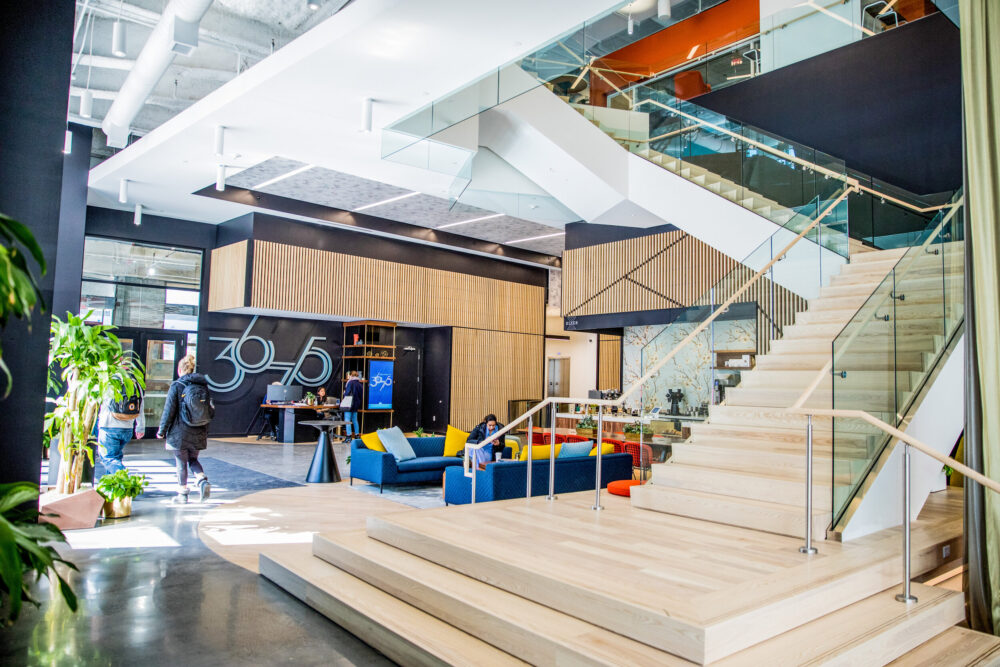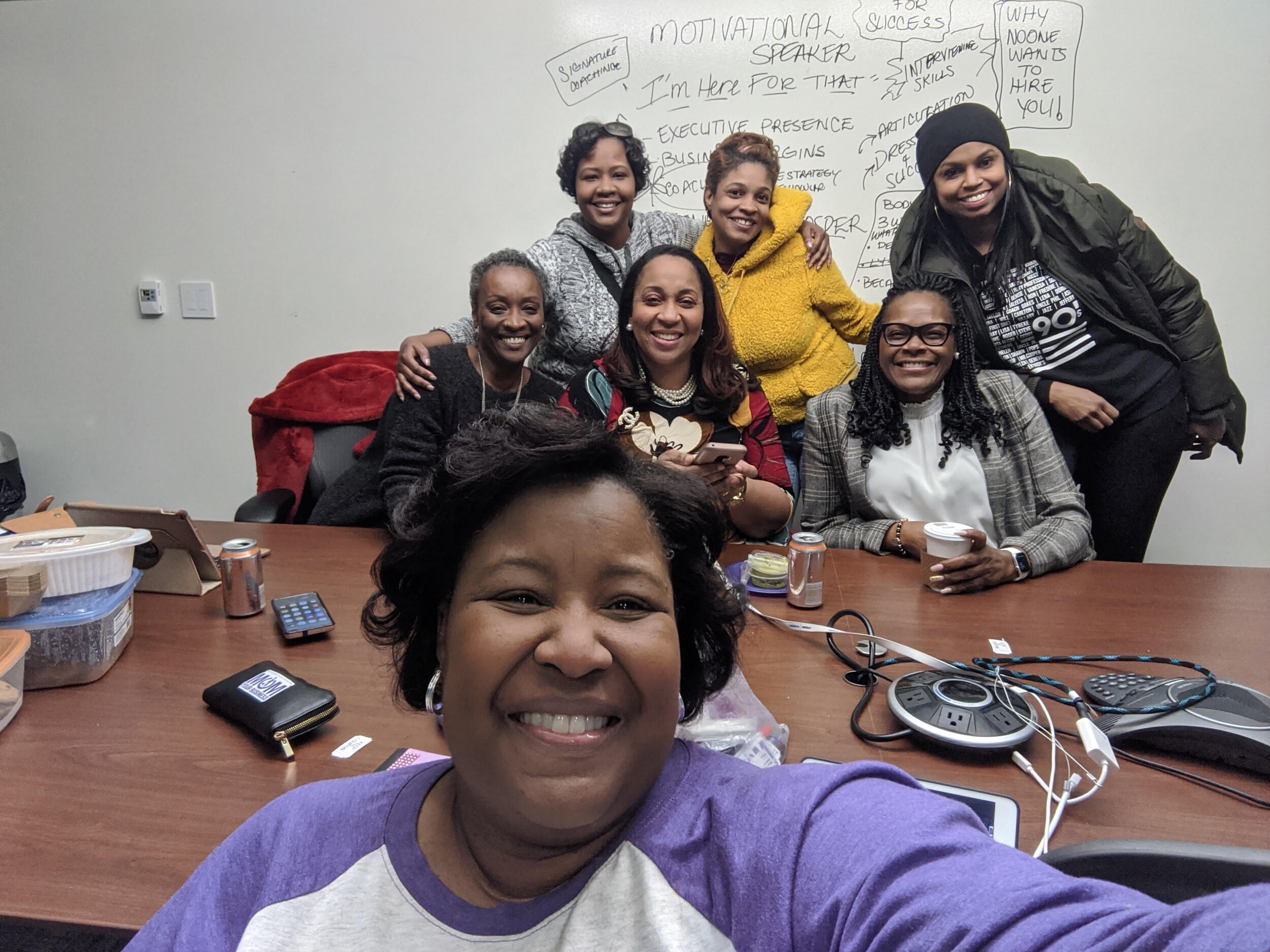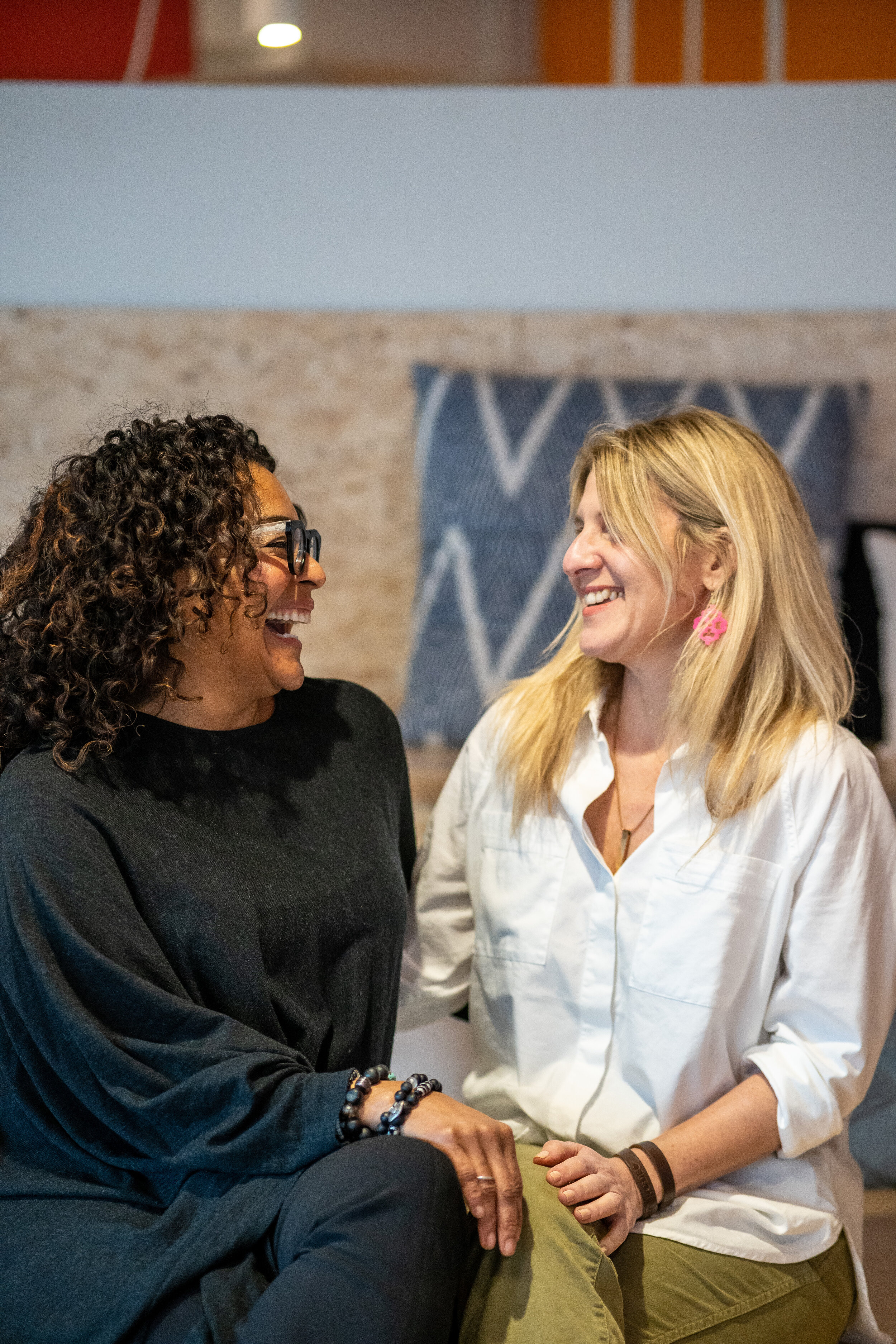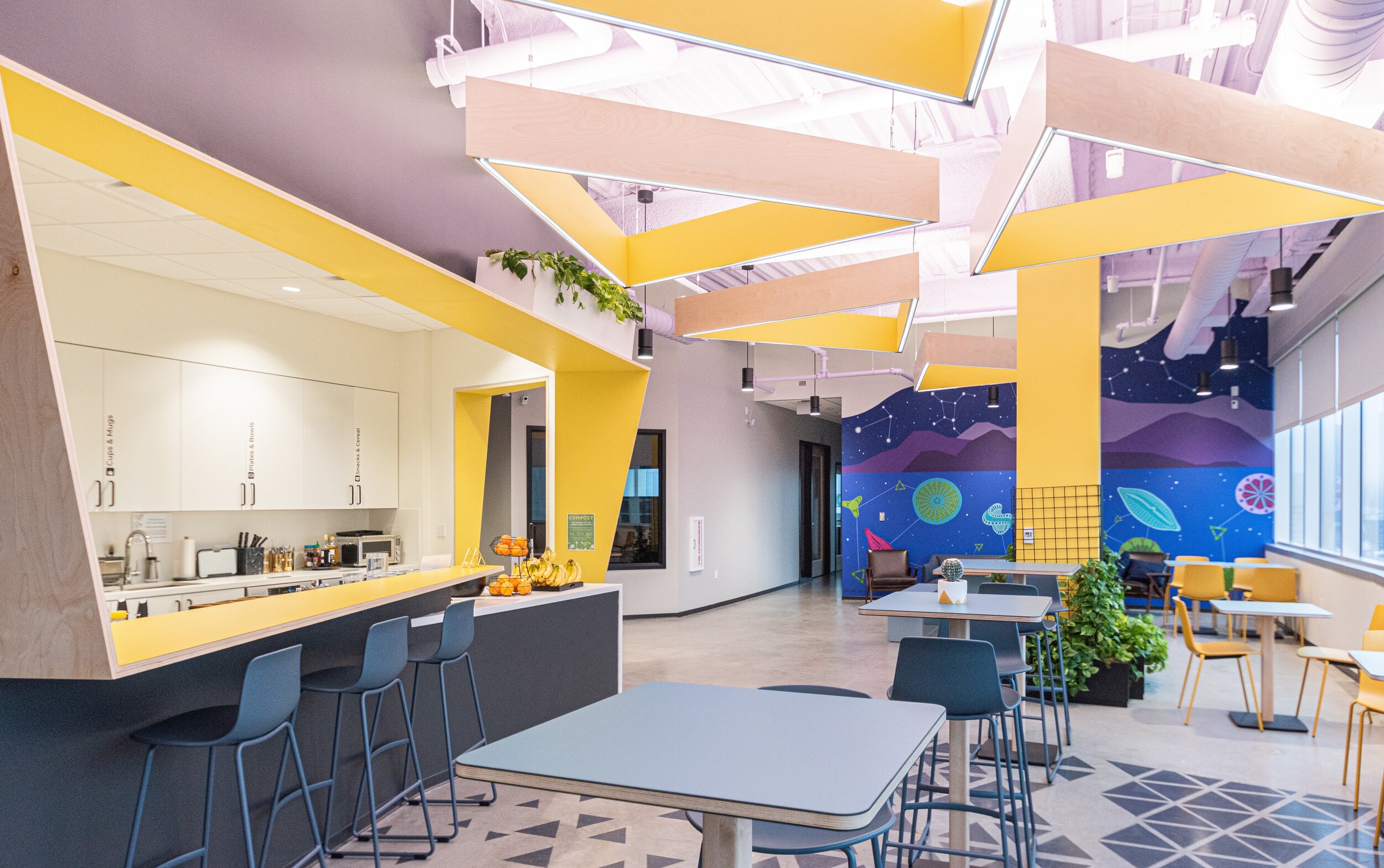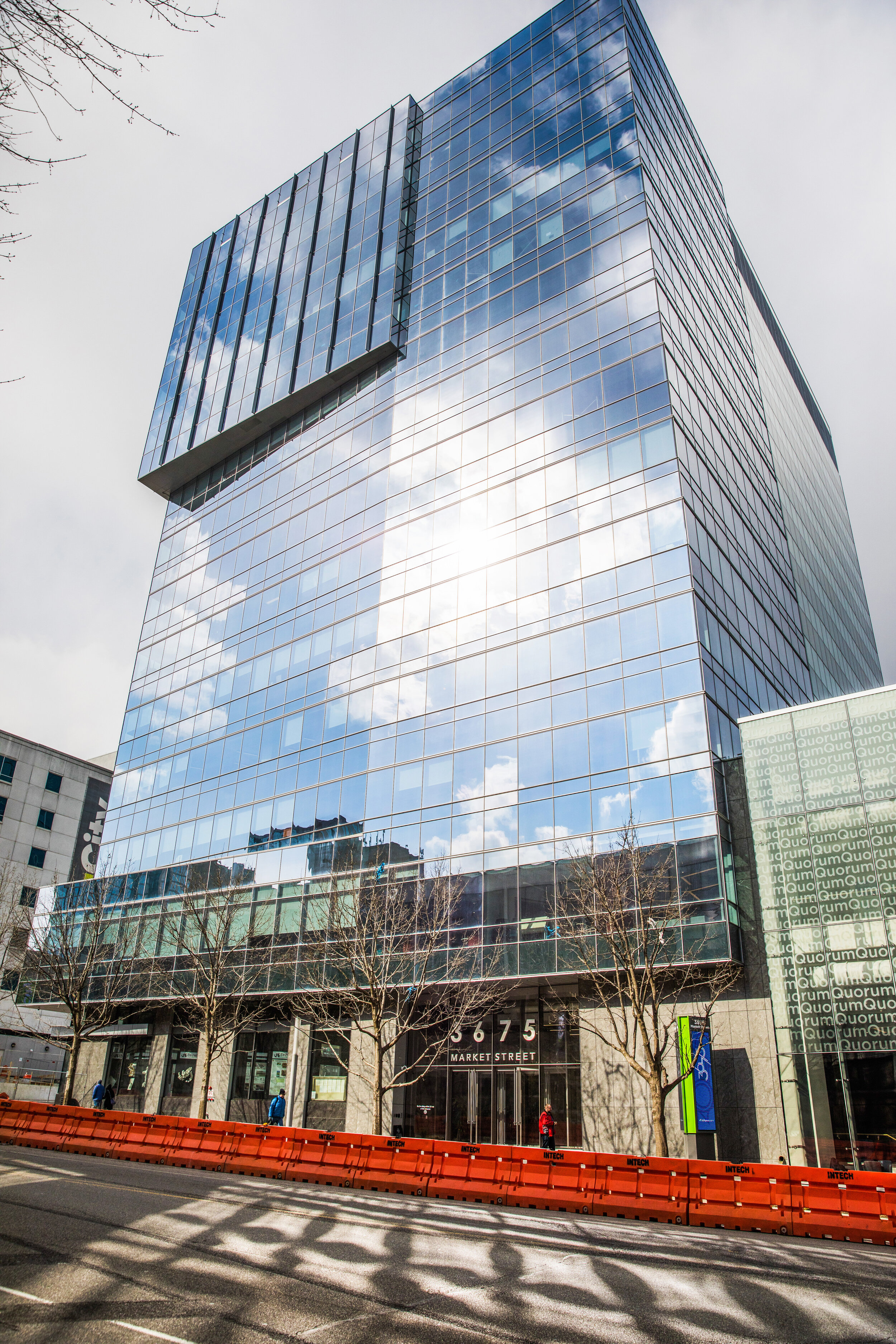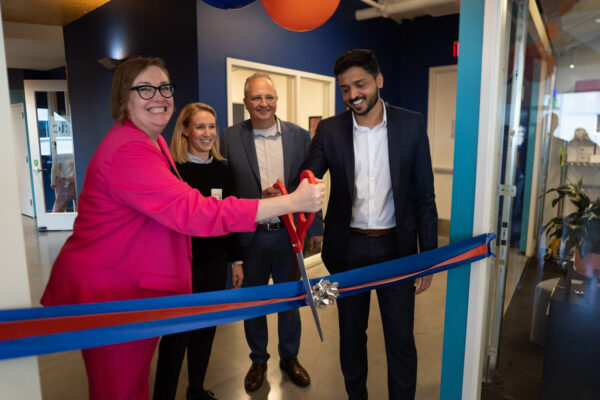CIC Philadelphia is seeking 36 life-altering, risk-taking entrepreneurs in need of safe workspace, support, and opportunity for our third 36for75 cohort.
The 36for75 program encourages collaboration and innovation by bringing together a diverse community of local entrepreneurs and nourishing their endeavors with resources, connections, and workspace — pro bono — for 75 business days.
Selected startups receive the full benefits of CIC membership plus special programming designed to support smaller, younger companies that may not have access to resources or opportunities to thrive.
We encourage entrepreneurs from underrepresented communities and industries not already represented by CIC clients to apply by answering one of three questions in a one-minute video submission by November 15.
Come behind the scenes now with CIC Philadelphia Director Sally Guzik, CIC Philadelphia Events Lead and 36for75 Manager Minna Hyon, and 2020 cohort members Aurora Archer and Pamela Raitt of The Bellatrix Group and Tanya Morris of MomYourBusiness to learn about the inspiration behind 36for75, the impact of the pandemic on the program, and what 36for75 has meant for the 2020 winners.
CIC: What is the vision for 36for75?
Sally: 36for75 is unique to our Philadelphia location. We’re one of nine CIC locations around the world. Each time we open in a new city, we develop a program specific to that city to engage and activate our space. We launched 36for75 when we opened here in 2018. It plays on the name of our building — 3675 Market Street — and allows us to meet the needs of entrepreneurs from underserved communities.
Philadelphia is a majority minority city with a significant access gap for underrepresented founders. 36for75 is a pillar for our engagement with smaller companies looking to connect with other companies to share resources and ideas. It has become our primary program that supports majority underrepresented founders. We’ve found that by creating a curated cohort of companies who represent diverse industries with their own diverse backgrounds, the cohort is more successful.
CIC: What does “success” look like for 36for75?
Sally: Competition isn’t what drives the success of the model, but rather collaboration. Each year, we’re most proud of our work when companies share what they were able to accomplish together.
CIC: This year’s cohort had just been onboarded when COVID-19 forced your space to shut down for all but essential businesses. How did that impact 36for75 and the cohort?
Sally: Unfortunately, it meant that companies who did not identify as “essential or life-sustaining” were not able to utilize the space to its fullest. We worked with the cohort to extend memberships until the end of July instead of April, as originally planned.
A large part of our cohort model is the collaboration that happens in person, so we had to quickly pivot to offer virtual engagement opportunities. Our events and relationship management team acted quickly and offered cohort members the opportunity to share lunch virtually and access subject matter experts through complimentary office hours.
Minna: When COVID first arrived in Philadelphia, it was a strange time of adjustment, and for us it was important to remind the cohort that we were still here as a resource for them. We created safe virtual spaces for any members who wanted to check in, ask questions, or make connections.
I think a crucial factor during this time was to provide flexibility for members to opt in and make the experience their own. For many of us, COVID brought immediate priorities to the forefront, like taking care of our families or making sure our businesses survived. Sometimes adding more obligated and unnecessary programming can have a negative effect instead of a positive one (Zoom fatigue anyone?), so we wanted to make sure we provided the space that could really allow members to show up as their honest selves if they needed that.
36for75 cohort member Tanya Morris and MomYourBusiness at work at CIC Philadelphia.
CIC: Cohort members, how did COVID impact your company and your vision for it?
Tanya: COVID and the shutdown were totally impactful. We were getting ready to use CIC’s podcasting study to do our “Impact” podcast on a regular basis when the city ordered the shutdown. We were also planning on launching an accelerator program in March, which we then pushed back to June as it became apparent COVID wasn’t going away anytime soon. The pandemic totally changed the way we serve people. We had to shift our focus to helping people navigate how they were going to stay in business doing this time.
Pamela: I consider Aurora and myself to be lucky for a few reasons. Having both come out of the tech industry and being very used to working remotely and with distributed teams, we were able to very quickly figure out how to leverage technology to our advantage and continue having workshops, webinars, client and prospect meetings, et cetera.
Secondly, because many of our clients are in the healthcare space, there continued to be a lot of work and thinking around solutions, versus a slowdown of work. Having said all of that, COVID did also offer us the opportunity to add some new things into our service mix, to take time to look at some foundational aspects of our business, and to figure out how we wanted to provide thought leadership about COVID and, in particular, its amplified impact on the Black community.
CIC: A big part of the power of CIC is its ability to connect creators, funders, and the community. Without the ability to do this on site, how did the CIC Philly team work to continue making connections for the cohort?
Minna: An important factor in our ability to continue to meet these needs for connection and opportunity was actively listening — listening to both our cohort members and the Philadelphia entrepreneurial community.
Initially with COVID, we knew most small business owners’ immediate needs were funding and resources to help combat business setbacks. We responded with a COVID-19 Aid Resource Guide that launched within two weeks and provided business owners in each CIC location with the most helpful local and national resources that we could consolidate.
It was also about how we responded in those smaller, intimate moments — informal emails and checking in with members, even by simply sending a Slack message with a reminder about local opportunities.
CIC: Cohort members, how did COVID change the way you worked with CIC and your peers in the 36for75 cohort, your expectations for the programs, and the support your organization received?
Tanya: When we started we were looking to open our own coworking space for Black and brown women to provide what they needed. Then we won and had a space, so being there was totally a blessing — to have somewhere to call home for that period of time where we could do our one-on-ones and host our meetings and support our moms who needed someplace to meet. Losing that was tough. I was still in the getting-to-know-you stage with most of the other cohort members and missed that direct contact. But CIC helped me with a really important connection. They connected me to the Science Center’s director of business incubation and accelerator programs for help with business pitching. She helped me learn about the principles of a pitch, and I now teach that to the women I serve.
2020 cohort members Aurora Archer and Pamela Raitt of The Bellatrix Group.
Pamela: The CIC team really is phenomenal about reaching out, checking in, and just continuing to find ways to add value and continue to foster connection, like they did for Tanya with the Science Center. The pandemic primarily shifted the cohort into “Slack mode,” which became a nice way of keeping in touch, checking in, and just continuing to feel connected to CIC and to our peers. It made us feel less alone.
Our expectation was that everyone in our cohort was likely going through a lot of the internal reflections that we were and that we were all in pivot mode. Our hope was that if we could be of assistance or service to anyone, then we would have that opportunity. It also helped us remember that we are a community and that there are so many entrepreneurs in the Philadelphia area — and that we are in this together.
CIC: What was the most important thing you gained or did as part of the cohort?
Pamela: We made connections with some fellow entrepreneurs whose work we greatly admire, and it has given us the ability to find ways to amplify what they are doing.
CIC: Sally and Minna, is there anything new in store for 36for75 based on the pandemic and the needs of the Philadelphia entrepreneurial community?
Sally: We’re launching Blactivate!’s makerspace and marketplace this fall with 2020 36for75 cohort member Mel LaMarre. Mel is an entrepreneur who owns and manages Mel’s Butter Blends. Blactivate! will be a space for collaboration and support among Black entrepreneurs.
Minna: The programming for the new cohort in 2021 will definitely look a bit different. We expect to be able to once again program events for the cohort to meet and network in person, but we’ll also have consistent virtual opportunities that fit into this “new normal” landscape. Rather than being reactive as we had to be this year, our programming will involve opportunities to connect in different ways that are more intentional. This cohort will also benefit from and be able to tap into the enhanced community relationships we built this year in reaction to the crisis.
CIC: What is your proudest moment of 36for75 2020? What lessons have you learned?
Minna: We had a short window of opportunity to have in-person programming for this year’s cohort before COVID hit, but even in that short amount of time, beneficial connections were created. During the 2020 36for75 welcome breakfast, Aaron and David Cabello, the founders of Black & Mobile, met Nicodemus Madehdou, a 36for75 alumni and the founder of Jump Button Studios (web, gaming, and app design). Now he is creating their mobile app. One of the most rewarding feelings is seeing members create their own connections and opportunities with each other, and I’m so excited to see what collaborations next year’s cohort will bring about.
CIC: How are the 36for75 winners chosen? What is that special something you are looking for that helps you identify people you believe can succeed with your support?
Minna: Every year a panel of judges — usually a city representative, a 36for75 cohort alum, some CIC staff, and representatives from our partners in the innovation community, like the Science Center — reviews the video applications and selects the winners based on factors like quality of the pitch and how creative or innovative the idea is.
The three application questions represent the core of what we are looking for in our applicants: Are you committed to your city, to your community, and to making positive change? The hope is that applicants that align with those questions will also align with CIC’s mission and vision for Philadelphia and beyond, optimizing the value that they will be able to take away from this experience.
CIC: What advice would you give people applying to 36for75 and this year’s winners?
Pamela: In terms of applying, just be yourself, be authentic, and be vulnerable to share the reality of where you are as a founder — as well as the moonshot of where you hope to be and how you envision 36for75 can help. If you win, spend as much time as you can in the space, even if that’s the virtual space. CIC and 36for75 have so much to offer in terms of resources and connection, and it’s all hugely enriching and valuable.
Tanya: I’ll share the advice I got through my connection at the Science Center. To try to win, you have to make sure your pitch covers the basic elements: State the problem and state the solution, then answer why me and why now. Any effective pitch has to have those four elements. If you win, always ask for help. All of the folks at CIC are so helpful and responsive.
CIC: This year was a one-two punch; first COVID and then the murders of innocent Black people that led to renewed awareness of and mobilization around the United States’ systemic racism. 36for75 specifically targets underrepresented founders. How did the current landscape change the way you envision your work and the work you are doing?
Tanya: It has really heightened the need for what we do and how we support these businesses. We really had to shift from small business development and supportive services like understanding social media and how to write a business plan to survival technique — helping people outfit their space for social distancing or know how to hold the BLM rhetoric being stated by companies accountable.
Black women have been the hardest hit by COVID and the unrest because so many work in restaurants or are service providers. We’ve spent a lot of time providing emotional and spiritual support. I can’t tell you the women I talk to who want to just give up and throw in the towel.
Pamela: Yes, yes, yes! The events of the last several months have strengthened our resolve to use our voices and platform to create needed change in this country. Through some of our own pivoting we were able to bring Aurora’s other business closer to ours, so that we now have a B2B offering around creating an anti-racist workplace culture. We continue to seek and find new ways to educate and call others in — particularly white people — to do the work and become accomplices to our BIPOC colleagues and fellow community members. We believe that doing this work should be a condition of excellence for companies, and we are continuing to build out this platform as an important offering for our clients, in partnership with The Opt-in Culture.
Inside CIC Philadelphia’s shared workspaces at 3675 Market Street.
CIC: What do you believe we need most right now here in Philly and in what ways do you hope to support the local community?
Sally: Most of our clients speak to the importance of connection in person. With COVID, it’s been hard to physically be in the same spaces together. We’ve been able to adapt and be flexible with how we work, from more people having time home, saving time on commuting, sharing more meals with our families. Those opportunities for virtual events and slowing the pace have been great for everyone to reflect on personal and professional priorities.
However, it’s also been a very isolating and depressing time for people who depend on interacting with others outside of their home. We understand even more how important it is for children and adults to interact outside of a virtual setting. I’m most looking forward to being able to share a meal, moment, and idea with people in person into the new year. Our centers depend on people physically coming together to collaborate. Having technological alternatives to connecting are definitely valuable, but they do not entirely replace the need to build empathy and care for others like person to person contact does.
My biggest fear is that COVID has set back underrepresented founders even more regarding opportunity, funding, and access to essential resources. Philly needs to invest in entrepreneurship both financially and with more opportunities for founders to access resources to continue to scale their businesses. We don’t want to lose our small business community and vibrant culture.
3675 Market Street, home to CIC Philadelphia and its partner University City Science Center.
Pamela: I believe we need to recognize that we are all one, together, in this community. That the homeless people living in an encampment across the Parkway from my luxury highrise could have just as easily been me had I been born into a different family or raised in a different way. We are more alike than different, and the more we can see ourselves in others, the better connected this city will become and the more we can close the gap of severe income inequity and racial divide.
Sally: Yes! Black founders continue to be underrepresented in tech and the leadership pipeline here, even though we’re a majority minority city. COVID has slowed momentum for all entrepreneurs. Given the significant opportunity gap that already existed for minority VC-funded ventures and the disproportionate way the pandemic affected Black, Latinx, and low-income communities, supporting these small businesses should be a very real concern for all Philadelphia leaders. 36for75 is one of the ways we work to increase access to resources and opportunities to help founders bridge this gap.
Tanya: Wow, we need so many things in this city. We need a poverty relief strategy and an end to gun violence strategy. I’m Philly born and raised and never wanted to live anywhere else. For me, one of the ways that I really want to try to support the city is by helping Black and brown female-owned businesses — in particular, the lesser-known ones — stabilize and grow. I mean, getting to a place where they become job creators. I view entrepreneurship as a path out of poverty, and as we do that — as we help them to grow — we can begin to alleviate some of the poverty constraints that lead to crime and poor health.
CIC: Before we finish, cohort members, tell us what’s next for you?
Tanya: This is the great follow up to your last question. We’ve been so overwhelmed lately with just helping people stay afloat. Moving forward, we’re creating an accelerator program for Black and brown women, ages 50 and up, who are currently in business and seeking another stream of income. These are women who are bootstrapping but who haven’t been able to move to bankability. By the end of their work with us, they’ll have a strategy and an opportunity for pitching angel investors, equity crowdfunding, and VCs. We will probably try to access people from CIC for this next step.
Pamela: We’re working on the continued evolution of our product and service model to enable us to sustain growth and do work that we are genuinely passionate about, while also serving our community.
Aurora: To be specific, we’re doing this by deepening the integration of our human-centric and cultural approach into the work we do with clients to connect them with the evolving needs of audiences.
Applications for the 36for75 program’s 2021 cohort are open through January 15th, 2021. If you are an entrepreneur looking to grow, connect, and make an impact in Philadelphia, we would love to hear from you!
